
Review of Regional Studies
Scope & Guideline
Illuminating the pathways of regional transformation.
Introduction
Aims and Scopes
- Regional Economic Development:
The journal explores various aspects of regional economic development, including strategies for economic growth, the role of local governance, and the impact of public policies on regional economies. - Social Vulnerability and Resilience:
Research on social vulnerability, particularly in the context of crises such as the COVID-19 pandemic, is a critical focus, examining how different communities adapt and respond to economic shocks. - Spatial Dynamics and Urban Studies:
The journal emphasizes the importance of spatial analysis in understanding urban development, land use, and the socio-economic factors that influence regional dynamics. - Cultural and Historical Contexts:
Papers often investigate the historical and cultural contexts that shape regional identities and economic trajectories, providing a nuanced understanding of regional variation. - Innovative Methodologies in Regional Analysis:
There is a significant focus on employing innovative methodologies, including quantitative modeling and qualitative assessments, to analyze regional issues and inform policy.
Trending and Emerging
- Impact of Technology on Regional Development:
There is a growing focus on how technological advancements, including AI and automation, influence regional economies and labor markets, reflecting current global trends. - Sustainability and Environmental Concerns:
Research addressing sustainability, particularly in the context of urban planning and resource management, is on the rise, emphasizing the importance of environmental considerations in regional development. - Social Equity and Inclusion:
Themes related to social equity, inclusion, and the impacts of policy on marginalized communities are increasingly prominent, reflecting a broader societal push towards addressing inequality. - Crisis Response and Resilience Planning:
The recent focus on resilience planning in the face of crises, such as the COVID-19 pandemic, underscores the need for regions to adapt and respond effectively to unexpected challenges. - Cross-Border and Global Regional Dynamics:
There is an emerging interest in cross-border interactions and global networks, examining how regional economies are influenced by international trends and relationships.
Declining or Waning
- Traditional Economic Theories:
Research employing traditional economic theories without consideration for contemporary complexities and interdisciplinary approaches has seen a decline, as scholars increasingly favor more integrated and innovative frameworks. - Rural Development Focus:
Papers specifically devoted to rural development, while still relevant, have decreased in frequency, possibly due to a growing emphasis on urbanization and metropolitan studies in regional research. - Static Models of Regional Analysis:
The use of static models for regional analysis has waned, as there is a shift towards dynamic models that account for change over time and the evolving nature of regional economies. - Homogenous Regional Studies:
Research that treats regions as homogenous entities without acknowledging internal diversity and disparities is becoming less common, reflecting a trend towards more nuanced and differentiated analyses.
Similar Journals
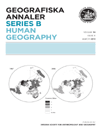
GEOGRAFISKA ANNALER SERIES B-HUMAN GEOGRAPHY
Elevating scholarly discourse in human geography.GEOGRAFISKA ANNALER SERIES B-HUMAN GEOGRAPHY, published by Taylor & Francis Ltd, is a leading academic journal dedicated to advancing the field of human geography. With an ISSN of 0435-3684 and an E-ISSN of 1468-0467, this journal has established its reputation since its inception in 1976. It currently holds a prestigious Q1 ranking in Geography, Planning, and Development, reflecting its significant impact in the academic community with a Scopus rank of #243 out of 821 in its category, showcasing a 70th percentile standing among its peers. The journal aims to publish high-quality, innovative research that enhances our understanding of the complex interactions between humans and their environments. Although it operates on a subscription basis, the rigor of its peer-review process and the quality of published articles make it an essential resource for researchers, professionals, and students alike. By exploring pivotal themes in human geography, the journal not only contributes to academic discourse but also informs policy-making and practical applications in the field.
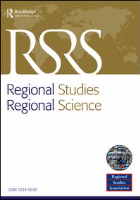
Regional Studies Regional Science
Empowering Research for Sustainable Regional FuturesRegional Studies Regional Science is a pioneering journal published by Routledge Journals, Taylor & Francis Ltd, specializing in the interdisciplinary examination of regional dynamics and their effects on economic, social, and environmental landscapes. Established as an open-access journal since 2014, it ensures widespread dissemination of knowledge, promoting accessibility for researchers, professionals, and students alike. Based in the United Kingdom, this journal has garnered a notable reputation, holding a Category Quartile ranking of Q2 in 2023 across various fields, including Economics and Econometrics, Geography, Planning and Development, and Sociology and Political Science. Its rankings in the Scopus database reflect its growing influence within the social sciences, positioning it as a valuable resource for contemporary regional studies. With a commitment to high-quality research, Regional Studies Regional Science serves as a vital platform for the exchange of innovative ideas and empirical findings that address the pressing challenges faced by regions worldwide.
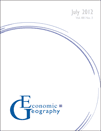
ECONOMIC GEOGRAPHY
Exploring the Intersection of Economy and SpaceECONOMIC GEOGRAPHY, published by Taylor & Francis Ltd, is a premier journal in the fields of Economics and Geography, acclaimed for its rigorous exploration of the spatial dynamics of economic processes. With an ISSN of 0013-0095 and E-ISSN of 1944-8287, this journal boasts a remarkable standing reflected in its 2023 Q1 category rankings in both Economics and Econometrics and Geography, Planning and Development. Positioned within the top percentile of its categories in Scopus rankings, it is a vital resource for researchers, professionals, and students seeking to understand the complex interplay between economic activities and geographical contexts. Published in the United Kingdom, the journal maintains a rich archive dating back to its inception in 1972, making it a significant repository of knowledge for those examining economic geography across decades. While not an open-access journal, its in-depth articles provide crucial insights into pressing economic issues and contribute to advancing scholarly discourse in the discipline.
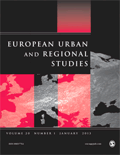
EUROPEAN URBAN AND REGIONAL STUDIES
Pioneering Research in Urban and Regional TransformationEUROPEAN URBAN AND REGIONAL STUDIES is a premier journal dedicated to advancing the field of urban and regional studies, published by SAGE PUBLICATIONS LTD, a distinguished publisher renowned for its contributions to scholarly communications. Established in 1994 and running through 2024, this journal provides a vital platform for interdisciplinary research that addresses the complexities of urban environments and regional developments across Europe and beyond. It holds impressive distinctions, ranking in the Q1 category for both Environmental Science and Urban Studies in 2023, reflecting its strong impact and influence—ranked #31 out of 279 and #42 out of 219 in Scopus, respectively. Scholars and practitioners seeking to contribute to or stay informed on trends in sustainable urban development, policy-making, and regional planning will find this journal indispensable. Its contributions not only shed light on pressing urban issues but also cultivate a dialogue that bridges theory and practice. Enhance your understanding of contemporary urban challenges by engaging with the rich tapestry of research published in this esteemed journal.

PAPERS IN REGIONAL SCIENCE
Connecting scholars to tackle regional challenges.PAPERS IN REGIONAL SCIENCE, published by Wiley, is a leading international journal dedicated to advancing the understanding of regional science and interdisciplinary approaches to geography and environmental planning. With an impressive impact factor and a prestigious Q1 ranking in both Environmental Science and Geography, Planning and Development, this journal serves as a critical platform for disseminating high-quality research from 1955 to 2024. Covering a diverse scope including regional development, spatial analysis, and environmental issues, it facilitates discussion and knowledge exchange among scholars and practitioners. The journal is recognized for its rigorous peer-review process and its commitment to addressing pressing societal challenges through research. As a vital resource for researchers, professionals, and students alike, PAPERS IN REGIONAL SCIENCE fosters innovation and collaboration within the field, contributing to a deeper understanding of the complexities of regional systems.

Revista de Estudios Regionales
Exploring the Dynamics of Regional Studies.Revista de Estudios Regionales is a distinguished academic journal published by ASOC UNIV PUBLICAS ANDALUCIA-AUPA, focusing on various fundamental areas in the social sciences, including development, economics, sociology, and political science. Established in 1978 and converging its publication years to include recent contributions until 2024, the journal serves as a critical platform for international scholars and practitioners interested in the regional dynamics of Spain and beyond. Despite its current Q4 ranking in key categories such as Development, Economics, and Sociology, the journal aims to elevate discourse and foster a deeper understanding of regional studies, ultimately contributing to policy-making and academic dialogue. Accessible to readers without open-access provisions, this journal is a valuable resource for those seeking to engage with the latest theoretical and empirical research in the field. Scholars, graduate students, and policy professionals will find the journal’s insights particularly beneficial for advancing their work and understanding of regional phenomena.
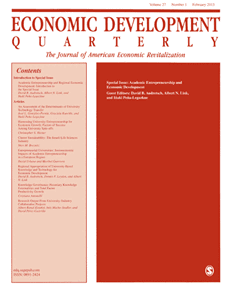
ECONOMIC DEVELOPMENT QUARTERLY
Empowering voices in the discourse of socioeconomic policy.ECONOMIC DEVELOPMENT QUARTERLY, an esteemed journal published by SAGE PUBLICATIONS INC, serves as a pivotal platform for disseminating high-quality research in the fields of development economics, urban studies, and socioeconomic policy. Since its inception in 1987, the journal has evolved to reflect contemporary challenges and solutions in economic development, while maintaining a robust academic rigor evidenced by its Q2 rankings in 2023 across key categories. With an ISSN of 0891-2424 and E-ISSN of 1552-3543, this publication engages a diverse audience of researchers, practitioners, and students dedicated to understanding and shaping the dimensions of economic growth and community development. Although Open Access options are not available, the journal's commitment to innovation in urban studies and development science remains unwavering, making it an essential resource for those striving to influence economic policies and research methodologies in an ever-evolving global landscape.
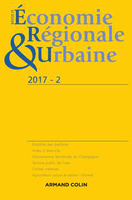
Revue d Economie Regionale et Urbaine
Fostering dialogue in the heart of economic geography.Revue d Economie Regionale et Urbaine is a prestigious journal published by ARMAND COLIN, dedicated to advancing the field of regional and urban economics. Renowned for its rigorous peer-reviewed articles, this journal provides a vital platform for scholars, practitioners, and students to explore contemporary issues, methodologies, and case studies in regional development, urban policy, and economic geography. With its ISSN 0180-7307 and E-ISSN 2107-0865, the journal facilitates widespread dissemination of knowledge, although it currently does not offer open access options. Situated in Paris, France, Revue d Economie Regionale et Urbaine plays a critical role in fostering dialogue and innovation among academics and policymakers alike, contributing significantly to the understanding and enhancement of urban and regional economies.

Letters in Spatial and Resource Sciences
Innovating Solutions for Spatial and Resource ChallengesLetters in Spatial and Resource Sciences, published by Springer Heidelberg, is a prestigious journal dedicated to the interdisciplinary exploration of spatial and resource-related issues within the fields of demography, economics, geography, planning, and urban studies. Since its inception in 2008, this journal has provided a platform for cutting-edge research, facilitating the exchange of innovative ideas and methodologies that address contemporary challenges in spatial dynamics and resource allocation. With an impact factor reflecting its robust standing in academic circles (notably ranking Q2 in Demography and Geography, and Q3 in Economics and Econometrics as of 2023), it serves as an essential resource for scholars and practitioners alike. The journal is committed to fostering open dialogue and advancing the understanding of spatial phenomena, making it a vital asset for anyone engaged in these dynamic areas of study. Targeting a diverse audience, from researchers to industry professionals, it aims to enhance scholarly communication and promote evidence-based solutions to spatial and resource dilemmas.
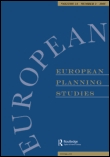
EUROPEAN PLANNING STUDIES
Innovating Planning Solutions for Tomorrow's CitiesEUROPEAN PLANNING STUDIES is a leading journal in the field of urban studies, published by Routledge Journals, Taylor & Francis Ltd. Since its inception in 1993, this esteemed publication has been pivotal in advancing the discourse on geographical, planning, and developmental issues across the European landscape. With a commendable 2023 Q1 rating in the Geography, Planning, and Development category and a remarkable rank of #88 out of 821 in Scopus, the journal is recognized for its rigorous peer-reviewed articles that provide innovative insights and critical analyses. Although the journal does not offer open access, it caters to a diverse readership, including researchers, professionals, and students, ensuring a comprehensive understanding of contemporary planning challenges and strategies. The journal's objectives include fostering interdisciplinary dialogue among planners, policymakers, and academics, making it an essential resource for those engaged in shaping sustainable urban environments and informed spatial governance in Europe and beyond.